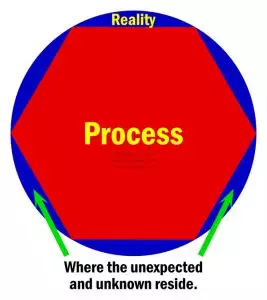How Processes Work To Make The Average Worker Great
How processes work to make average workers great seems simple. They show them how to do things. In this sense processes are like recipes. Yet, this answer does not come close to answering many other questions about them.
Example Of How Processes Work To Replace Engineers With Laborers
For example, take a firm developing a new way to recycle plastic. At the moment, engineers do all this. Yet, this won’t work as a business. It’s too costly.
So, they are turning this into a process that hourly laborers can run. Then, they’ll only need one engineer rather than six. He’ll oversee the process.

How processes work is based on fitting a reality to produce an outcome that minimizes the unexpected and unknown.
A Better Answer On How The Average Become Great
The take away is this. Processes reduce the need for talent. They make average workers great. Here, the process replaces engineers with laborers. If processes just show people how to do things, it does not answer why this happens.
For instance, it doesn’t answer:
- Why do they still need one engineer?
- Why doesn’t the process make engineers better?
A better answer on how processes work to answer these is that reduce the unknown and unexpected. However, no process, no matter how good can remove all uncertainty. No process fits reality perfectly.
That’s why the firm above still needs an engineer. She has to deal with the unknown and unexpected that come up. The firm does not need six though.
Yes, processes can help the engineers and other talented workers. However, it’s more about speed, consistency and efficiency. It’s not about raising their game, expertise and talent unless it’s to replace still higher level workers.
Ponder this. A paint-by-numbers set helps me paint great looking pictures. It’s a process. It helps me do work closer to that of an artist. It does not help a true artist though. Cooking recipes do the same. They help the average cook do what only a pro might be able to do.
Dealing With The Reality And Problems Processes Address
When facing a new reality, many uncertainties exist. It takes talent to deal with them. Putting a process to the reality makes the unexpected expected and the unknown known.
Dealing with the reality and problems the process addresses becomes easier for others. Thus, they need less talent to do so. They don’t need to grasp what the process addresses. I can paint by numbers without knowing painting.
That leaves the talented to deal with the reality and problems the process does not address. It just needs fewer of them. The average and less costly have replaced them.


